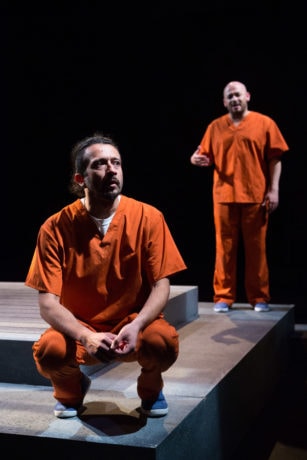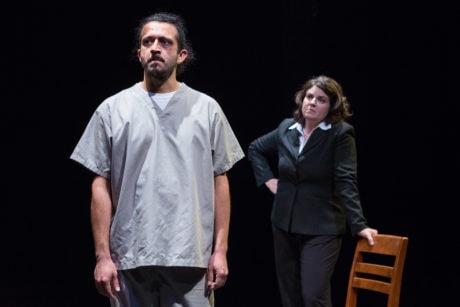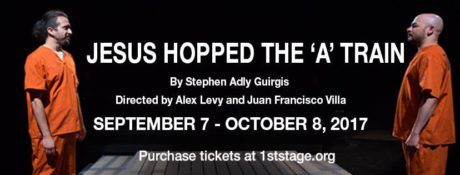Stephen Adly Guirgis’s Jesus Hopped the ‘A’ Train, now in production at 1st Stage, opens while the audience is still finding their seats. On a raised platform, in the round, Angel Cruz (Luis Alberto Gonzalez, in an exhausting and haunting performance) is trapped inside a cell that gives him no room to move. He’s all tight-muscled anxiety and potential coiled energy. We have no idea what his crime is, no way, in those moments before the play starts, of knowing his guilt or innocence. We only know he’s a man, trapped, with no way to move and nowhere to move to.

This staging, in the round, and in media res – conceived by set designer Jessica Cancino – is genius, and an integral introduction to this incredibly assured piece co-directed by Alex Levy and Juan Francisco Villa. Guirgis’s play asks a lot from us from the very beginning, but isn’t interested in answering our questions. If your first response to seeing Angel incarcerated is, “Well, clearly, that man is guilty and that’s why he’s here,” Levy and Francisco Villa are not interested in correcting your early conclusion. If your first response is to hold your judgment until you have more information, Levy and Francisco Villa aren’t necessarily interested in that, either. What the directors have done, instead, is trusted each audience member to work out her own ideas, grapple with her own subjective points of view and stereotypes. This isn’t theater that is interested in letting you leave with a message; this is theater, instead, that sees value in the questions.
We do eventually learn that Angel has Done Something: he shot a man. It would be too simple to suggest that the next step the play takes is deciding whether Angel was justified or not. Guirgis – and this incredible cast of actors – are too smart for such an easy avenue. They are all, also, too interested in the bigger question lurking just behind justification: Does it matter if Angel was justified or not? Does it matter if any of our bad decisions, or wrong steps, or mistakes, are justified?
Helping us decipher these murky but necessary philosophical waters are two characters pulling Angel in different directions. There’s his public defender, Mary Jane Hanrahan (a heartbreakingly weary Teresa Castracane, who often makes her philosophical arguments directly to the audience as if we were her jury – and in a sense we are), who sees ethics situationally. And there’s the other prisoner whom Angel spends one hour a day with, on the roof, in the open: Lucius Jenkins, a man who has brutally and horrifically murdered eight people.
Frank Britton is nothing short of exhilaratingly astonishing as Lucious. He speaks in walls of profanity cadenced like a Shakespearean soliloquy. Like most sociopaths, he can be seductively self-assured, with all the answers you’d ever think to ask for. He has bewitched one guard (Robert Heinly, whose character movingly finds clarity after tragedy) into providing cigarettes and Oreo cookies. And he now wants to get Angel to a place of accountability. This point, I feel, is very important, and a key to where Guirgis wants to see us squirm: a man who has committed multiple acts of unspeakable violence and cruelty is in a position of being a moral guidepost in this play. It is a profoundly uncomfortable and upsetting place to be – but it’s also necessary.
(An interesting historical side-note: During the thick of The Inquisition, many priests found themselves on the wrong side of Church dogma and bound to a stake. What then, was the worry, happens to his flock? If a bad priest does a baptism, or a wedding; hears a confession or performs Last Rites; are these holy acts negated by his guilt in the eyes of the Church? The Church then explained that it’s the ritual, not the man, that conveys grace. Speak the words in the right order, move your hands in the right way, and the job is done, and done well. Put another way: a broken clock can be right twice a day. Put another way: A serial killer on a roof may know the direction to redemption.)

Jose Guzman’s Valdez muddies the moral code of this play even more. Valdez is another prison guard, a short man wielding his power over Lucius and Angel extravagantly. Valdez sees the world in terms of rules broken and rules followed. It matters little to him if you knew the rules before; they exist irrespective of your awareness of them. He speaks of useful things and useless things. He is all absolutes. Guzman’s portrayal is electrifying, even as it makes us squirm. He can be seen, perhaps, as speaking for a different kind of God than the religious-minded Lucius (who styles himself frequently as almost a prophet). If Lucius’s philosophy of God is that He is ever yearning for his creations to bend towards responsibility and redemption, Valdez can be seen as a Puritanical Calvinist: If you’ve sinned, you were always going to sin and the less time spent bemoaning your fate the better.
A play of this kind of moral complexity and hot-button timeliness could not have worked as well as it did without the cast it currently has. There are no weak players here. If Britton’s performance shines as brightly as it does, it’s only because he is able to build off his fellow cast members. Castracane’s Mary Jane is any of us looking to mend a psychic wound whatever the cost. Alberto Gonzalez’s Angel deftly thwarts our expectations at every turn. It is his soul that is, as the poet Anne Sexton writes, “a great weight, hung on a small wire.” Guzman functions as a Satan figure – but the trickster/troubler from Job more than the arbiter of true evil. True evil, according to this play, may or may not exist; but it’s Guzman, in the middle, who pushes both Angel and Lucius towards moments of direly painful clarity.
Brittany Shemuga’s lighting design transforms the intimate 1st Stage space from a claustrophobic cell block, to a roof-top confessional, to that liminal memory place between responsibility and justification where several of the characters tell their side. And Kenny Neal’s sound design, with its cold notes of cells locked or the soaring noise of gull cries, perfectly complement the action, bringing this world even more to life.
Jesus is a Responsibility Play wrapped in a Question Play. Each of the characters has a moment where they will have to wrestle with what they’ve done, and how that got them to where they are. It’s vitally important that audience members leave wrestling, too. This is a production that is not to be missed.
Running Time: Two hours 30 minutes, including one intermission.
Jesus Hopped the ‘A’ Train plays through October 8, 2017, at 1st Stage – 1524 Spring Hill Road, in Tysons, VA. For tickets, call the box office at (703) 854-1856, or purchase them online.
LINK:






Mike, it’s not particularly sophisticated to arbitrarily use “she” for the generic audience member. It’s pretentious and labored. The generic “he” is quite fine, but if it makes you uncomfortable, either say “he or she” or say “the audience member.”